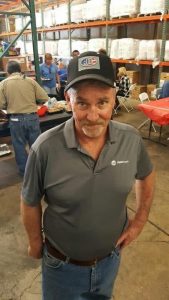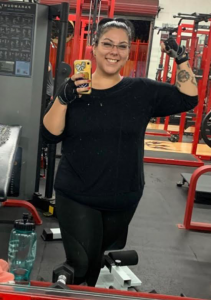
By Nicole Hamilton
I was 13 years old when my dad showed up to my softball practice drunk. I was playing third base, and I hadn’t noticed he was there until he screamed at me for missing a ground ball. He stumbled across the baseball diamond drunkenly while we were fielding balls, as if he was a coach. I could tell by the look on his face he was livid. I remember hoping my coach would not hit the ball at me anymore because tears filled my eyes and I could hardly see.
When practice was over, and everyone started leaving, one of the other moms grabbed my arm and said to my dad, “Sir, I don’t think you’re well enough to drive.” He grabbed my other arm and pulled me away from her, and it hurt. It took him nearly five minutes to figure out how to unlock the car. I thought about running home at that point. I didn’t, and he drove me home. We passed a cop at an intersection and I remember wishing he had pulled my dad over, but he didn’t.
If he had been pulled over, I think it could have forced a change. Both of my parents were addicts, so they fed into each other’s addictions. If one of them had been clean or sober, maybe things would have turned out differently.
Addiction is a chronic disease of the brain, yet many adults who have substance addictions are judged or condemned for it. This is especially true for parents who are addicts. The social stigma against alcoholics and addicts discourages both the parent and child from reaching out for help.
According to Ron Lee, an addiction counselor at Agape Addiction Counseling (AAC) Los Angeles County, parents who struggle with addiction spend more time drug-seeking than they do supervising their children, which puts the child’s safety under concern.
Maria Kesler, an addiction counselor for the Department of Mental Health in the child and adolescents program, says her mother often left her alone or with a babysitter when she needed to get her hands on drugs. It left a hole in her heart and soul. She later resorted to drugs to fill this empty space. Kesler says most children who have one or two parents that abuse substances are very likely to abuse drugs themselves.
Kesler first experimented with drugs when she was 13, starting with marijuana. She had an alcoholic father and a mother who abused prescription medicine. Kesler says her dad’s alcoholism was normal for her, but her mom’s addiction is what really impacted her.
The National Institute On Drug Abuse estimates roughly 25% of American children grow up in households where some kind of substance abuse is present. That can mean having three to four drinks a night, or more extreme drug or alcohol use.
According to Above The Influence, repeated drug use impacts a person’s dopamine function in their brain. Without drugs, the

ir life seems joyless. They will need drugs to bring their dopamine to normal levels and will develop a tolerance. This is when someone can be considered an addict.
A parent who has an addiction can lead to other problems in their children, such as poor academic performance, emotional and behavioral problems, low self-esteem, high risk of physical, verbal, or sexual abuse as well as high risk of developing anxiety or depression.
Kesler dropped out of high school in her sophomore year. When she was 18, her grandmother died, which caused her to experience extreme depression and led her to abuse heavier drugs, like meth.
AAC says that parents who are addicts often have a role reversal with their children. The child often takes over the caregiver role. Most children do not realize that they have taken this responsibility upon themselves. In this situation, the child may do things such as feeling they need to rescue a parent who has suicidal thoughts or severe depression, sleeping in the same bed with their parent who has anxiety over being alone, or using drugs or alcohol with their parent to create an emotional bond. They believe their parents’ drug or alcohol abuse is their fault.
When I started working, even though my dad had a good job, I still found myself paying the water bill, filling up their car with gas, and lending them money because the majority of his income went to marijuana, alcohol, and cigarettes. There were even times where my mom would harass me for days to buy them a pack of cigarettes.
According to the AAC, 40% to 60% percent of a person’s risk of addiction is accounted for in genetics, including the impact of one’s environment on gene expression (The process of information from a gene being used in the synthesis of functional gene production).
Environmental factors such as a chaotic home environment, parental drug abuse and peer influences can increase the risk of addiction in teenagers, as stated by the AAC.
Although Kesler has been clean for 12 years and is now an addiction counselor, she worries that her children are more likely to experiment with drugs. She and her husband met in rehab, so she knows her kids could have a genetic predisposition to become addicts. She fears that her children will follow their paths, so she keeps her two boys busy with constructive activities, like sports and crafts. Providing a busier, positive environment helps children stray away from negative activities such as drug abuse.
What saved me from falling into drugs was softball. Even though I wanted to quit the day my dad came on the field drunk, I stuck with it. It kept me focused on something and was an outlet for the built-up anger I had. So, instead of cracking open a bottle or lighting up, I hurled the ball and cracked the bat.

Softball saved my life. I wish it could have saved my dad’s.
When I was 19, my dad passed away from cardiovascular disease. He had marijuana in his system, and the autopsy report showed he was a heavy smoker.
All his life, he was stubborn. He was scared of doctor’s offices. When he was in pain, or sick, he simply resorted to marijuana and alcohol. He used them to numb the pain. I would probably still have my dad today if he had gotten the help he needed.
Now I don’t have someone to walk me down the aisle when I get married. I don’t have someone to fix my rundown Ford when it decides to break down. I don’t have that parent to listen to me and give me advice.
“Addicts don’t reach out for help because most of them never had anyone to want to help them, so they either don’t know the help is there, they aren’t ready for help or they think they can do it alone,” says Kesler. She adds that the best way to help those who struggle with addiction is by “providing information for those who don’t know, planting seeds for those that aren’t ready, and showing support for those who think they can do it alone.”
I don’t think my dad was ever ready for help. He was stubborn, and this had been his life for so long. The hardest thing is everything he did seemed normal to me. He was just dad. I knew he wasn’t going to change; this was his life. Still, I never saw it coming. I didn’t even get to say good-bye.
[/cmsmasters_text][/cmsmasters_column][/cmsmasters_row]
